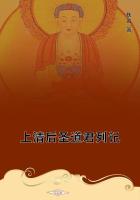Among the gypsies of Transylvania and Roumania the festival of Green George is the chief celebration of spring. Some of them keep it on Easter Monday, others on St. George's Day (the twentythird of April). On the eve of the festival a young willow tree is cut down, adorned with garlands and leaves, and set up in the ground. Women with child place one of their garments under the tree, and leave it there over night; if next morning they find a leaf of the tree lying on the garment, they know that their delivery will be easy. Sick and old people go to the tree in the evening, spit on it thrice, and say, You will soon die, but let us live. Next morning the gypsies gather about the willow. The chief figure of the festival is Green George, a lad who is concealed from top to toe in green leaves and blossoms. He throws a few handfuls of grass to the beasts of the tribe, in order that they may have no lack of fodder throughout the year. Then he takes three iron nails, which have lain for three days and nights in water, and knocks them into the willow; after which he pulls them out and flings them into a running stream to propitiate the water-spirits. Finally, a pretence is made of throwing Green George into the water, but in fact it is only a puppet made of branches and leaves which is ducked in the stream. In this version of the custom the powers of granting an easy delivery to women and of communicating vital energy to the sick and old are clearly ascribed to the willow; while Green George, the human double of the tree, bestows food on the cattle, and further ensures the favour of the water-spirits by putting them in indirect communication with the tree.
Without citing more examples to the same effect, we may sum up the results of the preceding pages in the words of Mannhardt: The customs quoted suffice to establish with certainty the conclusion that in these spring processions the spirit of vegetation is often represented both by the May-tree and in addition by a man dressed in green leaves or flowers or by a girl similarly adorned. It is the same spirit which animates the tree and is active in the inferior plants and which we have recognised in the May-tree and the Harvest-May. Quite consistently the spirit is also supposed to manifest his presence in the first flower of spring and reveals himself both in a girl representing a May-rose, and also, as giver of harvest, in the person of the Walber. The procession with this representative of the divinity was supposed to produce the same beneficial effects on the fowls, the fruit-trees, and the crops as the presence of the deity himself. In other words the mummer was regarded not as an image but as an actual representative of the spirit of vegetation; hence the wish expressed by the attendants on the May-rose and the May-tree that those who refuse them gifts of eggs, bacon, and so forth, may have no share in the blessings which it is in the power of the itinerant spirit to bestow. We may conclude that these begging processions with May-trees or May-boughs from door to door ('bringing the May or the summer') had everywhere originally a serious and, so to speak, sacramental significance; people really believed that the god of growth was present unseen in the bough; by the procession he was brought to each house to bestow his blessing. The names May, Father May, May Lady, Queen of the May, by which the anthropomorphic spirit of vegetation is often denoted, show that the idea of the spirit of vegetation is blent with a personification of the season at which his powers are most strikingly manifested.
So far we have seen that the tree-spirit or the spirit of vegetation in general is represented either in vegetable form alone, as by a tree, bough, or flower; or in vegetable and human form simultaneously, as by a tree, bough, or flower in combination with a puppet or a living person. It remains to show that the representation of him by a tree, bough, or flower is sometimes entirely dropped, while the representation of him by a living person remains.
In this case the representative character of the person is generally marked by dressing him or her in leaves or flowers; sometimes, too, it is indicated by the name he or she bears.
Thus in some parts of Russia on St. George's Day (the twenty-third of April) a youth is dressed out, like our Jack-in-the-Green, with leaves and flowers. The Slovenes call him the Green George. Holding a lighted torch in one hand and a pie in the other, he goes out to the corn-fields, followed by girls singing appropriate songs. A circle of brushwood is next lighted, in the middle of which is set the pie. All who take part in the ceremony then sit down around the fire and divide the pie among them. In this custom the Green George dressed in leaves and flowers is plainly identical with the similarly disguised Green George who is associated with a tree in the Carinthian, Transylvanian, and Roumanian customs observed on the same day. Again, we saw that in Russia at Whitsuntide a birch-tree is dressed in woman's clothes and set up in the house. Clearly equivalent to this is the custom observed on Whit-Monday by Russian girls in the district of Pinsk. They choose the prettiest of their number, envelop her in a mass of foliage taken from the birch-trees and maples, and carry her about through the village.
In Ruhla as soon as the trees begin to grow green in spring, the children assemble on a Sunday and go out into the woods, where they choose one of their playmates to be the Little Leaf Man. They break branches from the trees and twine them about the child till only his shoes peep out from the leafy mantle.














